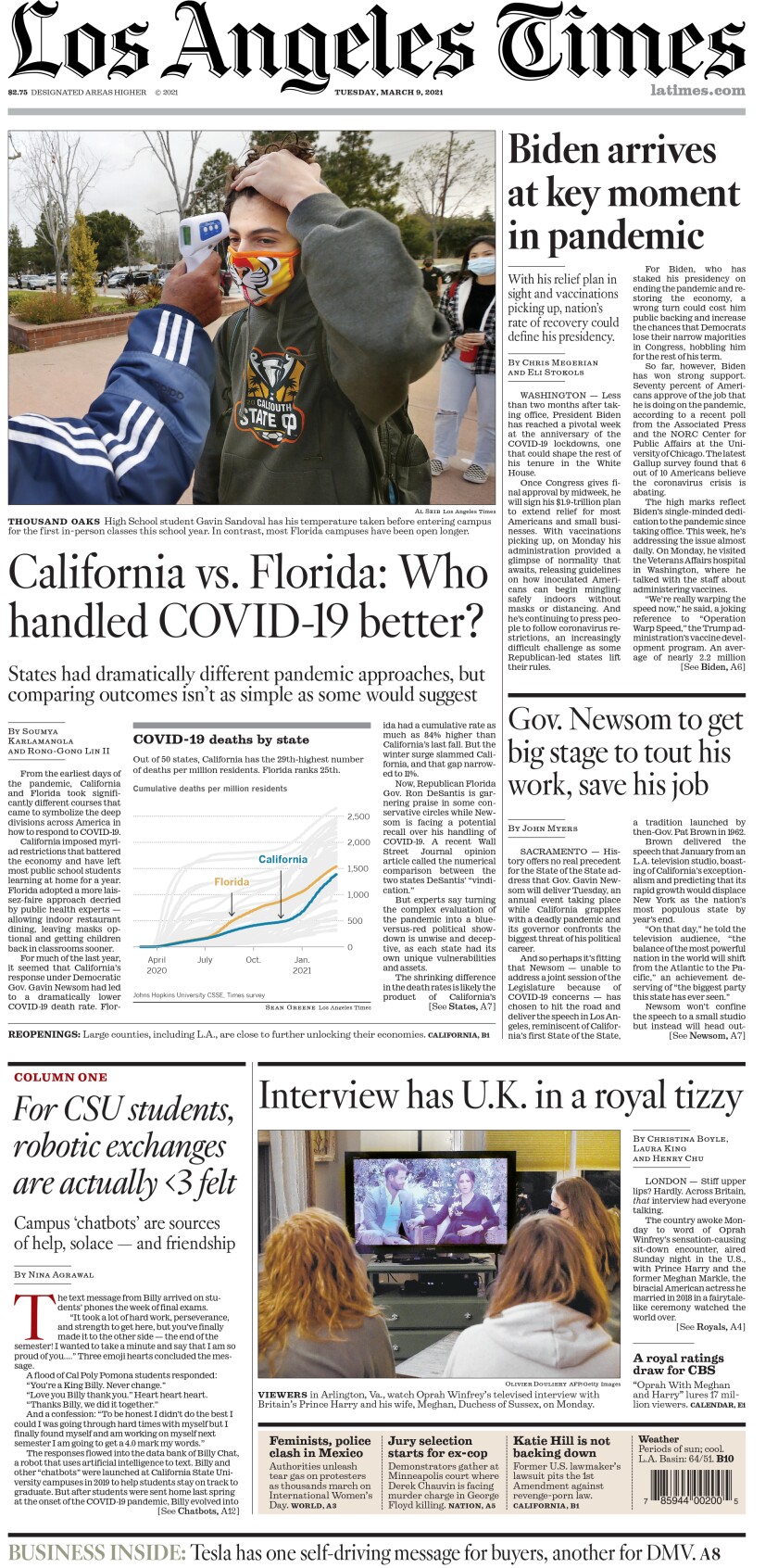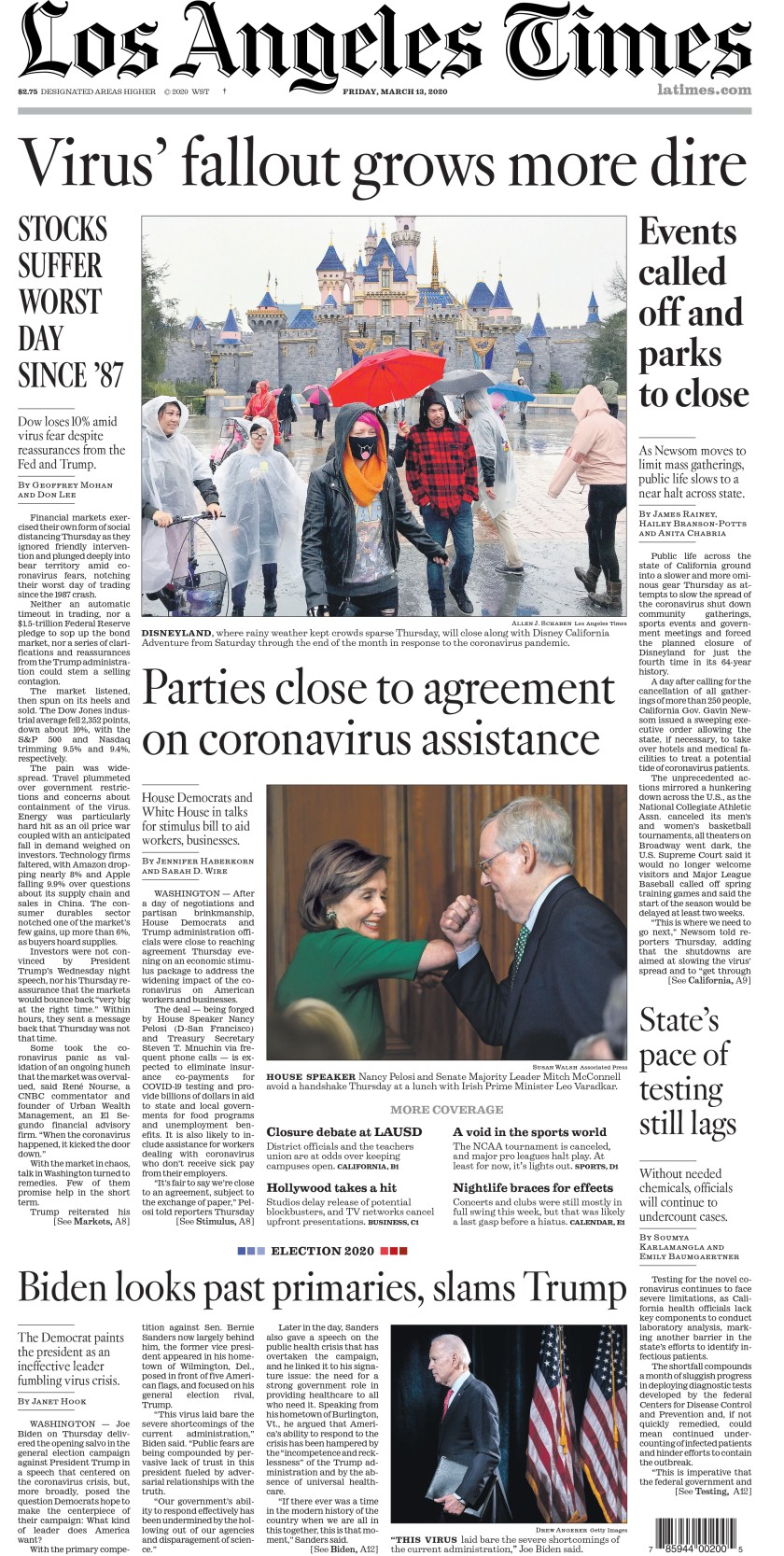This is the March 10, 2021, edition of the Essential Politics newsletter. Like what you’re reading? Sign up to get it in your inbox three times a week.
To start today’s newsletter, let’s get personal.
At the end of February 2020, I visited The Times’ offices in El Segundo for the first time.
I had been at the company all of two months, but in the Washington bureau. This was a chance to finally meet some of my colleagues in person. I went out to lunch with my team and met a friend for dinner. I spent a free afternoon at the Los Angeles County Museum of Art. And I took a full flight home. In retrospect, that trip was one of the last “normal” things I did.
Days after I returned to Washington, my world dramatically shifted. Over the course of an afternoon, my boss and I discussed whether I should quarantine after being on an airplane. My mom urged me to work from home. My husband did too. On March 10, 2020, I left the Washington bureau’s office, certain I’d be back soon. I wasn’t, of course.
Everyone has a story like mine — a story about the moment that neatly cleaved the past from the pandemic present. For many, that moment was a year ago this week.
Last March 11 brought a series of bombshell headlines: The World Health Organization declared COVID-19 a global pandemic. Tom Hanks announced he’d contracted the coronavirus. The NBA suspended the 2020 season. President Trump banned travel from Europe. On March 13, he declared a national emergency. So began a year of politics unlike any in memory.
How it started
The 2020 outlook: A March 8 Times story included this quote: “We’re past the point of containment,” said Dr. Scott Gottlieb, commissioner of the Food and Drug Administration during the first two years of the Trump administration, on CBS’ “Face the Nation.”
Days later, researchers cast doubt on the U.S. case count, suggesting the real toll was already much higher than officially reported. Health officials warned of dwindling supplies of tests and medical equipment.
“The system is not really geared to what we need right now,” Dr. Anthony Fauci, the federal government’s top infectious disease expert, told the House Oversight Committee. “That is a failing. It is a failing. Let’s admit it.”
Trump had for weeks downplayed the virus’ threat and continued to claim that Democrats and the media were overstating its risks. At times he directly contradicted experts like Fauci. It was an approach that drew criticism and highlighted existing flaws in the administration’s communications, Eli Stokols and Noah Bierman reported. Ultimately his own advisors blamed his erratic stewardship for his election defeat.
The headlines:
The relief: Discussions about an emergency relief package quickly began but slowed amid disagreements among Democrats, Republicans and Trump.
A Democratic proposal in the House included enhanced unemployment benefits, paid sick leave and a boost in the availability of food stamps, Jennifer Haberkorn reported March 11. House Speaker Nancy Pelosi (D-San Francisco) and Treasury Secretary Steven T. Mnuchin worked together on a deal, though it was ultimately slimmer than what Democrats had proposed.
Trump pressed for tax cuts, unsuccessfully seeking support from Senate Republicans. A strategy-planning lunch that week ended without agreement. Congress would not pass legislation to send to the president for two more weeks.
What the president was up to: He played golf at Mar-a-Lago and dined with Brazil’s President Jair Bolsonaro. He campaigned for reelection. He also agreed to stop shaking hands and cancel campaign rallies.
Trump focused on trying to mitigate the virus’ economic impact, including by announcing the European travel ban and a national emergency. He’d planned, after all, to take credit for a good economy in campaigning for a second term, Stokols and Bierman reported.
He was also tweeting — largely criticism of Joe Biden, his likely presidential rival, President Obama and other Democrats. “Sleepy Joe Biden was in charge of the H1N1 Swine Flu epidemic which killed thousands of people. The response was one of the worst on record. Our response is one of the best, with fast action of border closings & a 78% Approval Rating, the highest on record. His was lowest!” Trump tweeted on March 12, misrepresenting the facts about the 2009 contagion, which killed more than 12,000 Americans while Biden was vice president.
Enjoying this newsletter? Consider subscribing to the Los Angeles Times
Your support helps us deliver the news that matters most. Become a subscriber.
How it’s going
The 2021 outlook: Biden’s promises to rein in the pandemic are being put to the test. Congress is set to give final approval Wednesday to a new relief package that achieves a number of Democratic priorities.
Grief, loss and empathy have long been central to Biden’s personal story, as he highlighted in his campaign for president, Mark Z. Barabak wrote in September. He has staked his presidency on ending the pandemic and restoring the economy.
Americans have responded positively in polls. But the situation remains delicate, especially as some Republican-led states lift pandemic restrictions even as variants of the coronavirus are spreading, Megerian and Stokols write.
Republicans have almost unanimously criticized the stimulus package, calling it a “liberal wish list,” David Lauter writes. But increasingly, Democratic lawmakers and the Biden administration have decided to own that label.
The headlines:

The relief: The latest relief package, providing $1.9 trillion in assistance for individuals, businesses, states and local governments, is one of a series over the past year and brings total aid to more than $4 trillion.
Policy disputes slowed its progress and threatened to split the Senate Democratic majority, Sarah D. Wire reported. Senate Democrats disagreed on some provisions, including a minimum wage hike, eligibility for individuals’ relief payments and the amount of federal unemployment assistance.
The package was altered some to win the votes of moderate Democrats going into this week, disappointing some but ensuring the bill’s passage. The final package provides $1,400 checks for many Americans, an expansion of Affordable Care Act subsidies and tax benefits for families, Wire reports.
After the House vote to approve Senate-passed changes, which is expected on Wednesday, the package goes to Biden to be signed into law.
What the president is up to: Biden has a series of public appearances this week to highlight vaccine progress, economic aid and lives lost over the past year. He is also scheduled to deliver a prime-time address on Thursday.
The president has been tweeting, but not with the frequency, inaccuracy and occasional falsehoods of his predecessor. Biden’s posts have largely focused on encouraging Congress to pass the relief package.
The view from Washington
— Who are Biden’s Cabinet members and nominees? Introducing a new guide from The Times.
— The White House on Monday announced a temporary protected status decree that could allow tens of thousands of Venezuelans who fled their homeland to remain in the United States with legal standing, report Molly O’Toole and Tracy Wilkinson.
— Republican Sen. Roy Blunt of Missouri will not seek a third term in the U.S. Senate — the fifth Senate Republican to decide against running in 2022.
— The Republican National Committee is defending its right to use Trump’s name in fundraising appeals despite his demands that they stop the practice. He has urged his supporters to send money to his own PAC instead.
— Defense Secretary Lloyd J. Austin III has formally approved an extension of the National Guard deployment at the U.S. Capitol for about two more months as possible threats of violence remain.
— A Trump-era immigration rule denying green cards to immigrants who use public benefits like food stamps was dealt likely fatal blows Tuesday after the Biden administration dropped legal challenges.
The view from California
— At his State of the State address, Gov. Gavin Newsom made an aggressive effort to rekindle faith in his ability to lead a state tattered by the pandemic as he faces an attempt to recall him from office, Taryn Luna and Phil Willon write.
— The publication of private, intimate pictures of former Rep. Katie Hill that drove her to resign from office will be contested in court this week in an argument that pits the 1st Amendment against California’s revenge-porn law, reports Seema Mehta.
— California politicians used to out-tough each other on the death penalty, writes Barabak. But times have changed and so have candidates’ approaches.
Stay in touch
Keep up with breaking news on our Politics page. And are you following us on Twitter at @latimespolitics?
Did someone forward you this? Sign up here to get Essential Politics in your inbox.
Until next time, send your comments, suggestions and news tips to politics@latimes.com.



































